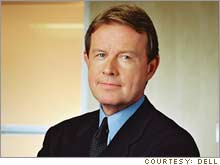|
'Tech Doesn't Matter ...' 'Want to Bet?'
A business guru and Dell's CEO clash over the true value of information technology.
(FORTUNE Small Business) - Ever since tech pundit Nicholas Carr published a provocative Harvard Business Review article titled "IT Doesn't Matter," business leaders have been debating Carr's thesis that information technology is becoming a commodity input like water or electricity. Although tech vendors tend to bridle at this assertion, nearly all firms run Office applications on Intel and Windows-based machines. Hardware is now so cheap that just about everyone can afford it. Your competitors have access to the same online information you do. It's not clear that ubiquitous, standardized technology can help any particular firm stand out. In short, where's the competitive advantage? For two very different takes on those weighty issues, we checked in with Carr (http://www.nicholasgcarr.com), a sought-after writer and speaker on technology issues, and Kevin Rollins, CEO of Dell (Research). Can technology give a small business a strategic edge?
CARR: Over the years, modern computing has become more accessible, more standardized, more homogenized. It is getting cheaper and cheaper all the time. And that just means that it's harder for companies to sustain an advantage by being a technology leader. As these trends play out, it becomes easier and easier for other companies to catch up. So as we move to this next stage, we're going to see even smaller companies being able to catch up. This, I think, will further neutralize any advantage that IT provides. ROLLINS: That's absolutely wrong. If that's true, then why don't all companies perform the same way? They've all got access to this standard technology! When you take those standard components, which are now low cost, the question becomes, Which technology do you implement? and then, What you do with it? So IT does matter. But now what counts most is the execution and implementation of all the standard pieces. And you can do that poorly. You can buy the wrong pieces, or you can buy the right pieces and do it well. You could make a similar argument for your telephone system. Clearly, telephones matter--you can't run a business without them ... ROLLINS: No, you can't, but telephones are all exactly the same, essentially. And what matters is whom you call and what you say to them? ROLLINS: I think that's probably true. But IT is a little different still, because you can take the components and put them together a little differently. You can use a website or not. You can use standard servers, or you can use proprietary technologies, which is very expensive. And you can also buy your computer system from a reseller, or you can buy directly from a company like Dell. So [it matters] how you put these things together and whether you use the full benefits of standardized products or not. CARR: Companies can outperform their rivals for all sorts of reasons. So variations in performance among firms with access to the same technology can probably be traced to factors other than technology, such as superior products or better customer service or an outstanding reputation. It's a fallacy to assume that IT is the only source of differentiation. But I agree with Mr. Rollins that companies can gain an advantage by managing information technology better than others. It's important to remember, though, that that's a management advantage, not a technology advantage. What are some specific technologies that can level the playing field between small companies and big ones? CARR: One that's been around for quite a long time is web hosting. You don't have to buy your own web server and all the software required to run it. For literally a few bucks a month you can go out and rent space on a hosted computer. You can do the same thing with e-mail. Right now it's very common for even ten-person companies to have their own [e-mail] server running in a closet somewhere. And it's kind of crazy, if you think about it. They have to pay for the server, they have to pay for someone to run it and keep it updated. With so much rich e-mail being provided over the Internet, that's another example of how you can move away from running your own systems. The trend that you're describing could ultimately bring everyone's data under the control of large computing utilities. Should companies worry about the security of their data in such a world? ROLLINS: Well, they might need to be worried about that, unless the data was safeguarded. My sense is that there are ways to safeguard a lot of proprietary and sensitive data. But I'm not convinced that we're going to move to a utility model for software or for hardware. A lot of customers don't find the economics of that particularly compelling. CARR: I think moving to a more centralized model will actually improve security. Right now company data is spread out across thousands of PCs and data centers, each of which is a link that can be exploited to get into your systems or to remove data from your systems. Companies aren't uniformly good at protecting these links, and some of them become weak links. The entire business of computing utilities will hinge on being able to provide very high levels of security. And I think their motivation will be to absolutely be on the cutting edge of every security issue. ----------------------------------------------- Get the latest technology news. Click here.
To write a note to the editor about this article, click here. |
|

